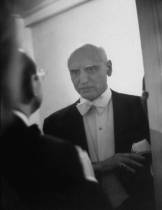
Victor de Sabata (April 10, 1892 - December 11, 1967) was an Italian conductor and composer. He is widely recognized as one of the most distinguished operatic conductors of the twentieth century, especially for his Verdi, Puccini and Wagner. He is also acclaimed for his interpretations of orchestral music. Like his near contemporary Wilhelm Furtwängler, de Sabata regarded composition as more important than conducting but achieved more lasting recognition for his conducting than his compositions. De Sabata has been praised by various authors and critics as a rival to Toscanini for the title of greatest Italian conductor of the twentieth century, and even as "perhaps the greatest conductor in the world". De Sabata's conducting style combined the fiery temperament, iron control and technical precision of Toscanini with greater spontaneity and attention to orchestral color. He was exceptionally demanding of his players: according to one musician: "Those eyes and ears missed nothing ... the players had been made to work harder than ever before and they knew that, without having been asked to play alone, they had been individually assessed". On the podium he "seemed to be dancing everything from a tarantella to a sabre dance". Norman Lebrecht describes him as "a musician whose mild manners turned to raging fury whenever he took stick in hand". One critic used the phrase "lull and stun" to summarize his technique.
A violinist in the London Philharmonic Orchestra compared de Sabata with Sir Thomas Beecham, saying that while Beecham made the orchestra "red hot", de Sabata made it white hot. Another player described de Sabata's appearance when conducting as "a cross between Julius Caesar and Satan". Double-bass player Robert Meyer, who has played under many leading conductors including Furtwängler, Karajan, Klemperer, Giulini, Walter, Koussevitzky and Stokowski describes de Sabata as "undoubtedly the finest conductor I have ever encountered". He conducted rehearsals, as well as concerts, from memory.
A musician who played under both Toscanini and De Sabata at La Scala compared them, saying," [Toscanini] wasn't like "Dede" -- De Sabata: he, too, was a great conductor, but he was changeable. One day he would be fine and would conduct a certain way; the next day he would be full of aches and pains and would conduct a different way. He was always somewhat ill. He, too, would be transformed, once he picked up the baton... and I must admit that Tristan und Isolde made an even bigger impression when De Sabata conducted it than with Toscanini. Toscanini was perfection: upright, even. De Sabata, on the other hand, pushed and pulled the music. Afterwards, when Toscanini had left, De Sabata was the only one who could take his place. Despite his faults, he, too, was a great conductor and a musician of the highest order. Once, in Turandot, he heard a mistake made by the third trombone, and it was discovered to be a printer's error that not even Toscanini had caught.”
Conductor Riccardo Chailly reports that De Sabata would have the strings sing along with the trombone glissandi at the climax of Ravel's Bolero, and that Chailly himself asks orchestras to do the same thing.
Antonín Dvorák
Symphony no 9 in E minor, Op. 95 "From the New World" New York Philharmonic Orchestra Conductor: Victor de Sabata Rec.: 26.03.1950 (live)
| 
